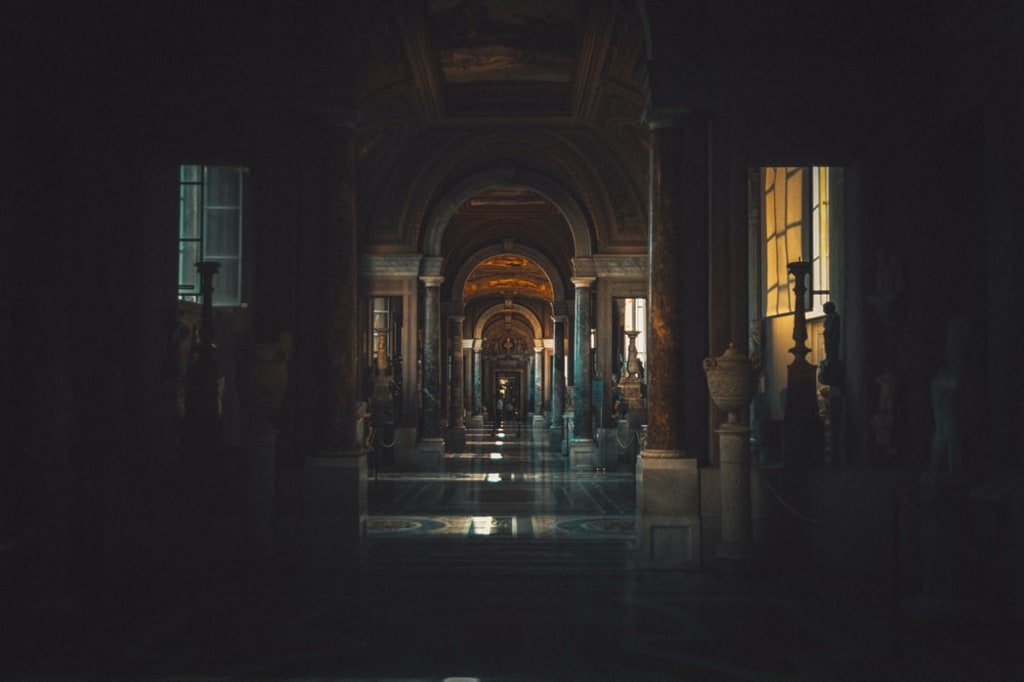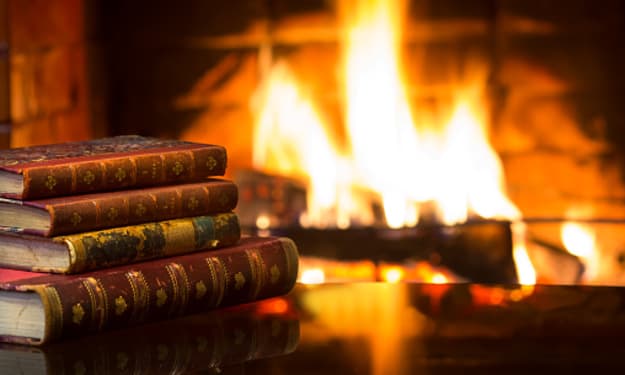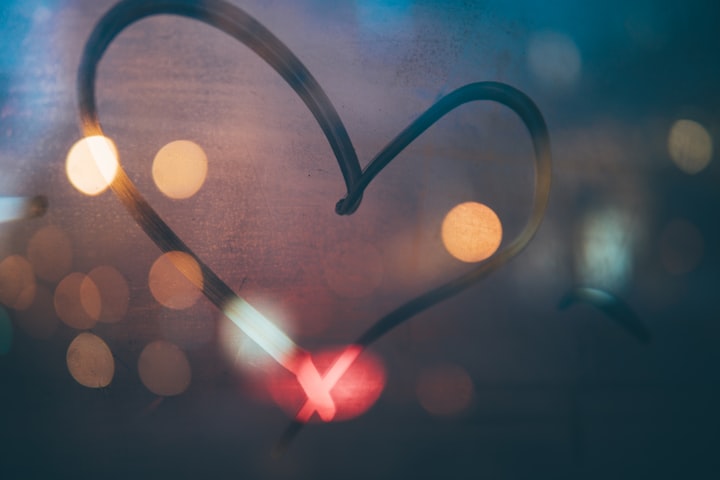The Peculiar Visitor of the Night Watchman
A short story

If we're being completely honest, then Charlie Tibbs was not the best candidate to become the night watchman for the Museum of Classical Art. It wasn't that Mr. Tibbs was at all bad at his job: he was thrilled by it, and had been for the past fifty-three years, ever since he'd left the farm with its large barn and mooing occupants for the big city. He took every nightly tour with a methodical nature honed by time, and punctuated by an appreciation of the same paintings and statues he'd admired every night before this one. He was always cordial, always on time, never slept through the wee hours of the morning, never took his lunch break somewhere he wasn't supposed to--in short, he was perfect in all but one aspect.
Charlie Tibbs, though he felt quite protective of every art-piece in the Museum of Classical Art, was by nature utterly timid. He was quiet, and said little in response to Mr. Jepsen asking aloud if they might get a man younger than seventy-one to guard their precious artifacts--and that had been at a meeting with the Board of Directors to praise his long decades of work! The only reason he'd stayed past that was that Barclay spoke up for him, and whatever Barclay said was as good as law to the rest of them.
Even the mice had become accustomed to Charlie Tibbs, and spent their nights wandering lackadaisically over his shoes and staring up at the fridge where he kept his sandwiches. And Mr. Tibbs, the night watchman of the Museum of Classical Art, didn't much mind if they were walking about at night. When he saw them, he called to them by name as if they might answer, and told them in great detail how he loved the artwork in whichever room they were in. Usually then, the mice were bored enough to leave.
It may come as no surprise that Charlie Tibbs was a lonely old fellow. He'd had a quiet life, filled in with days asleep and nights among the silent hallways. He caught up on the news and the latest network dramas by use of the small portable TV in his office. He read avidly, and reading was a constant companion of characters. Sometimes while he walked, he might read aloud to the statues who bent their ears to listen, statues who never replied but always seemed to smile. Yet besides these bronze and marble figures, and his employers whom he saw perhaps twice a month, there was nobody else he interacted with.
Such was the cycle of life for Charlie Tibbs, so when he looked up from his desk to find a mouse skittering along, its whiskers twitching as it sniffed up at him, he just smiled and went back to what he was doing. A moment later the mouse was gone, which wouldn't have been so odd except for the manner in which it vanished.
A small sound came along the air of the darkened museum. Charlie picked it up at once; his hearing was still acute and he knew each sound in the museum by heart. It almost sounded like whistling, breezing fast along, from the gallery with the Picasso in it, now entering the narrow hallway with Louis Remmond's collection, drifting along the main columned hallway closer to his booth--
As the mouse vanished, a sharp squeak filled the chamber, and Charlie scrambled back, almost falling out of his chair. His eyes widened; on the desk--
A rather large owl sat perched, on the desk, the mouse's flailing feet and tail disappearing down its gullet. Charlie blinked at it: the brown and white-spotted feathers were immaculate, and so softened down that it if it weren't moving and smacking its proverbial lips, he might've mistaken it for another statue. The head jerked around, as owls' heads often do, looking at him and then down towards his forgotten book. Then the bird had the audacity to peck at the cover, to which Charlie Tibbs took minor offense.
"Hello," he said, wheeling his chair back in towards the desk and carefully reaching for his book. He got it unscathed, and the owl's head followed, finally looking back up towards him. "You're very pretty, but I don't think you can be in here, you know."
The owl, not caring, hopped down off the desk onto his leg.
"Well-- um-- hello," Charlie Tibbs tried again, clearing his throat. The owl trotted along before nestling itself in on his thigh and staring up at the book. Charlie followed the gaze, realizing in the process that he'd unconsciously held it high up, away from prying beaks.
Well, thought he, I could always find another copy.
He brought the book down, showing the bird the cover. It tilted its' head and poked at the book gently, then wriggled itself around, as if trying to open it.
Charlie opened the book up for the owl, who ruffled its feathers contentedly. His bookmark slipped out of place, and he opened to that precise page and caught it.
The owl shut its eyes and hooted once, nestling down on his leg.
Charlie, thinking it was asleep, started to close the book--
The owl blinked awake and pecked at his arm, looking up with a grumble.
Charlie kept the book open. The owl looked up at him, then at the book, and finally at him again, exasperated.
Thinking that this was a very strange little bird, Charlie cleared his throat again and started to read out loud. After a sentence, he glanced back over; the owl's eyes were shut again, and it had lowered itself into a ball of feathers on his leg.
So, Charlie Tibbs spent an entire shift reading to this owl.
Even more bizarrely than seeing it arrive on his desk was the manner in which it left. There wasn't, in fact, much to see; Charlie heard the bell striking five in the clock tower beyond the museum in Carson's Square, and, looking up, found that the bird was no longer there. It wasn't anywhere in the office; nor, did he realize, was his door at all opened in the entire time he'd been sitting there. Not to let a bird in or out. Thinking this was extremely peculiar, but not at all minding some company, Charlie got up with a wince and stretched and made his way around the museum on his usual morning rounds. Nothing out of place at all--nor any sign of any owls. So, confused and wondering if he might've fallen asleep all night, he went to his small house three blocks down the road, and while the world woke up he went to bed.
But the next night, after he'd completed his rounds and was settling in to continue his book, a lump of warm feathers settled on his lap as well.
Peering over the top of the cover, he found two expectant yellow eyes. He blinked and they blinked; he tilted his head and the owl tilted its head. Before he came in to work, he'd gone online and meandered his way through Google, finding finally a picture of the same kind of owl. It was what was known as a little owl--an Athene Noctua. But they were only supposed to be in and around Europe.
"You're a rather far way from home, you know that?" Charlie Tibbs said, still peering over the book. The owl huffed and puffed up its feathers. Charlie balked, hiding his eyes behind the book--the owl's head peered up over the pages, blinking with huge eyes, and a moment later he felt its warm head thump against the back of his hand. He smiled, relaxing, and the owl settled itself in on his lap again, and another night was wasted in the wonderful pass-time of reading.
And, though he thought sneakily to keep watch over the bird when the hours were drawing on to morning, Charlie Tibbs again found that the rascal had eluded him when it came time to get up and get the museum back to life again.
On the third night, perhaps more unexpectedly, there was no visitor to the little glass booth Charlie sat in. He glanced at his watch, at the book left unopened and waiting, at the mice skittering along the floor. Finally, an hour after he'd settled in from his rounds, he heard a tapping on the window, and looked up to see the little owl's familiar face outside peering in. Perplexed, Charlie got up and opened the door for the bird, only for it to tap again at the glass, looking towards the book. Charlie grabbed the book and poked his head outside of the booth; the moment he did, the owl spread its beautiful wings and flew off.
Startled and hardly realizing why, Charlie rushed out after it into the dark museum.
It was foolish, but as he ran hurriedly after the soaring creature, he realized he quite liked its company. Someone to read to and someone who shared the stories back, even if they couldn't speak-- a creature of living flesh and feather rather than bronze and stone--
It whistled along overhead on its velvet wings, drifting high in the grand exhibition hallways and easing lower in narrow passages. It never looked around, but could very well hear Charlie following it; the sound of his hurried footsteps clopped along the hallways and echoed through what seemed to be miles of empty rooms. He never tried to call for it to come back--thinking suddenly it had some purpose, somewhere to lead--nor did he ever lose sight of it. It flapped its wings hurriedly twice or thrice to slow its progress, letting him find it around sharp corners.
The owl led him upstairs, into the East Wing of the museum. The rooms were further and further away from the world below, tighter and narrower and exhibiting pieces that beamed out radiantly for rare company. The owl glided by paintings of Venus, paintings of Perseus, and at a statue of Poseidon Charlie thought he heard a soft tone of disgust in its throat. It finally turned the corner into a last room--one he recognized as one of his favorites.
As he went in, the small lights came on. It was made up to be a temple room, with columned pillars and statuary interwoven between each. The lights were a sunset glow, streaming in through imaginary windows, and the central light dashed itself along the face of the central figure, which now the owl alighted upon.
Charlie Tibbs stopped in front of the small rope barrier, looking up with awe at the glory of Athena.
It was a piece of exquisite marble, and traces of a green robe still played out along its folds. The carving stood almost unaltered: her robe made to billow out to her side in the wind, a shield upon her back and a Gorgon-infused mantle upon her chest, a helm of wisdom in battle crowning her head and her right hand holding a spear, in preparation and calm anticipation of the future. Her face was radiance, and if the Mona Lisa held the ghost of a smile in its inscrutable features then the Goddess Athena was outright laughing with mirth.
The owl, he noticed after a second, was perfectly still. Its feathers had lost their luster; it was a dim piece of marble perched on her shoulder.
Silence filled the museum, and Charlie waited, looking up, before finally bowing his head politely.
"Hello," he said.
Hello, a voice murmured against his mind. It had no tone, but it was calm and complete, as if a part of the thin fabric that makes up the air itself. Would you mind if I spoke through my lips instead? I do not wish to frighten you.
"Oh!" Charlie looked back up at the statue. She had not moved in the slightest, but something in the light made him think she had, even just for a moment, before turning her face back to its resting position. "Of course; I don't want to inconvenience you, ma'am."
There was another silence, and Charlie waited, aware he ought to be nervous but not feeling anything of the sort. He wondered if the statue might spring off the pedestal and turn its spear down on him, or if the statue would come to life, creaking Talos-like closer--
He saw, under the faded sunlight, a shimmering rush along her features, and then, despite being pure white stone--her eyes opened.
A shiver ran through him, but in an instant he knew she wasn't there to harm him.
Her eyes turned gently downwards to face him. Looking into them was looking at twin pools of sunset: they crackled, effervescent, shifting and shading in color with twinkling golden specks. He thought, after staring slack-jawed, that they held underneath an essence of grey, or possibly blue--some light-hearted color of thin steel. And in the time it took to grasp the mystery of her eyes, the rest of her had long since shaken off the marble dust encasing her, and stood colored with almost golden olive skin, green and blue vestments, pure silver armor, and cascading darkened hair.
"Hello," he said meekly, averting his eyes to her legs and feet in a bow of his head. Her towering form and the perfection of her entirety made witnessing her feel almost sacrilegious.
"Hello," murmured back a voice echoing with the wisdom of millennia.
"Your owl has been kind enough to spend the last few nights reading with me," Charlie said for lack of a coherent thought to say. "Or-- not reading, but I've been reading to it, rather."
"My owl is but a reaching-out of my arm," Athena said, the echo of her voice a pleasant hum in the temple room. "You've read to me these past two nights, but I wished to have your company in person upon this one."
"Oh!" Charlie bowed his head further. "That's very generous, ma'am, thank you."
Her legs shifted, and Charlie hurried a step back. He watched as she stepped off of the pedestal, over the dividing rope, and stood now in the center of the floor. As he dared a glance up, he saw that her spear had been placed calmly down where she'd stood along with her helm, leaving her uncrowned hair haloing with a million reflections of the brightest light. He bowed his eyes again.
"Come," she said, "let us sit. You needn't read out loud if you do not want to tonight; I shall read over your shoulder. Though, I do quite enjoy your voice for Pandesowna."
Athena laughed, and the music of her filled his ears and heart with such overwhelming sensation that he was seated upon one of the benches in the temple, silently weeping, before he had any notion that she'd tugged his arm along and now sat beside him.
In another moment, the book was open in his hands, and they read.
For the first few pages, he did not speak a word, except to whisper a meager question of if she were in need of more time per page. She shook her head with a smile. After the first chapter ended, he cleared his throat, and in a voice first timid and trembling, began to read aloud. But his voice grew, and grew, echoing in the chamber and bending each statue's ear to him; he spoke with wild accents; he gestured with the arm not reading; he acted and sang the written songs and sneered and pleaded and swore; he swooned and sought and beheld, outpouring his heart with the animated reverence to detail as would impress such an important listener at his side. And from his side he felt the warmth of contact, the smile of generosity and companionship, the wistful patience of ages long past. His voice reached out, tendrils of it slipping mistily throughout every passage of the museum, every gallery and hall, until every painting too listened in with baited breath and an agony of impassioned interest as the chapter ended.
But finally, somewhere distant, somewhere far off beyond the reach of the temple, there was the ghost of the chimes of the clock tower in Carson's Square.
Charlie Tibbs faltered, and his back, which had straightened for the first time in thirty-five years, fell slowly as the tortoise drew back within itself again. He put the bookmark in his book, glancing over at his once-marble companion.
Athena said nothing, but slipped her fingers around his arm, standing and pulling him to his feet. She turned the old night watchman to herself, brushing down his uniform. He bowed his head in thanks.
Before he could speak his thanks, or express any of his sorrows that the night was ended, she said:
"Have you ever traveled, Charlie Tibbs?"
Surprised, he shook his head no. The smile grew on her exquisite features.
"Would you like to come traveling with me?"
Charlie Tibbs, for once not looking away from her smile, smiled in kind and nodded.
"Then we shall learn to fly."
She pulled his hand up, and without realizing any change had occurred, Charlie realized he was no longer on the ground. He smiled, then laughed, and tossed the book carefully down on the bench for when he returned. Feathers spread along the Goddess in front of him, encasing her arms into wings and her robe in a belly of brown and white: the owl's yellow eyes met his, and a pleasant hoot came from her. Looking along himself, he saw the same feathers spring up, and in another moment she glided back, turning out of the room, and though it took him a few minutes to get the hang of it, he followed, and they left the museum to soar, high in the city and higher still into the clouds.
* * *
Barclay was unhappy, but not for the same reasons the rest of them were unhappy. Jepsen, that rotten, unfeeling, cynical businessman, was bemoaning the loss of so many precious artifacts. He went on and on about "if the old man had done his job," but finally even Weems who sided with him most times had told him bluntly to please stop.
The robbery had happened over the long, quiet hours of the morning. Somehow they'd all gotten in without the alarm being triggered; they would've made it past Charlie Tibbs easily. And the policeman that had come by when they'd triggered the alarm on the way out was recovering in the hospital--if Tibbs had been there, he would've been roughed up, and they all knew that. But Tibbs had been--
"Well, we'll hire a young man this time--" Jepsen began--
"Shut up." Barclay's voice growled over the board meeting, and Jepsen went deathly pale and fell back in his seat.
Charlie Tibbs had been found that night sitting in the temple room of the East Wing. They thought initially he'd fallen asleep, but the old fellow's heart had in fact stopped. They put the estimated time of death around the same time the robbers broke in--the dead middle of the night, about an hour past when Tibbs' normal rounds would've ended. But he had apparently stayed up in the East Wing, which perplexed Barclay greatly.
They did, in fact, hire a younger man this time. A Mr. Andrews was brought on, fresh out of college, and he did his rounds on time before retiring to the television. When Barclay asked him, after the first month, if he was all settled in, the response was a satisfactory "yes but--"
"But?" Barclay had asked.
"Well," Mr. Andrews had said with a bit of embarrassment, "try as I might, I think there's an open window somewhere."
"What do you mean?" Barclay frowned.
"Well, sir, I keep hearing things, as if there's bats or something in the air rushing through. I finally saw them two nights ago, though I couldn't find where they disappeared to."
"Bats in the museum?" Barclay's face became a scrunched tomato of lines.
"No, sir: owls. Two owls, absolutely inseparable and flying around each other when I saw them. One that was brown and white, and one that was a goldish-white sort of color. I looked up what kind they are; one of them is a type that's supposed to be over in Europe, but the other is a barn owl. I used to read those Ga'Hoole books growing up; I nicknamed that one Soren. It looks a bit older though with all the white feathers."






Comments
There are no comments for this story
Be the first to respond and start the conversation.